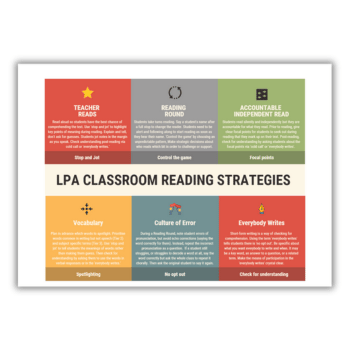Cross-curricular literacy – All subjects need lessons in reading

English teachers and external programmes alone can only do so much to improve cross-curricular literacy – but get other departments on board, and the sky’s the limit, discovers Molly Bolding…

Placing a whole school focus on reading can benefit all departments and subjects. As well helping to build cross-curricular literacy, it can also develop a culture of comprehension – but when it comes to improving whole school literacy, where should you start?
The ‘obvious’ answer may be to look to a school’s English department, or certain external providers and programmes – but relying solely on these can limit the scope and potential of whole school literacy improvement efforts.
No escape
To find out more, I spoke to Harriet Cornwell, a history teacher at Lodge Park Academy in Corby, Northamptonshire. Her school uses Accelerated Reader, but incorporates it into a broader whole-school offering that also includes six Classroom Reading Strategies and the school’s ‘DEAR’ initiative (‘Drop Everything And Read’) which sees 30 minutes set aside for reading at the same time each day, irrespective of subject. The school additionally organises a wide variety of literacy-focused activities in each subject, fostering the view that reading is an essential practice, no matter which department you’re in.
As a teacher whose subject relies on comprehension and source analysis, Harriet is acutely aware of literacy’s significance in improving student performance across the board. “Fundamentally, I think every subject has got an element of literacy,” she suggests. “We have a mantra, ‘Every teacher is a teacher reading’. I think you can’t really escape it.”
Harriet was keen to explain to me the many ways her department has found to work literacy skills practice into students’ historical learning – starting with making the department’s reading materials much more accessible. Almost the entire history curriculum, from KS3 to Y13, has been ‘bookletised’ – a process that involves converting traditional textbooks and other heavy tomes into straightforward, student-size reads. Students, Harriet intuited, would learn more easily if the materials they were given were more streamlined.
The information contained in the booklets is organised by lesson, rather than topic, with each important passage of text given plenty of surrounding space for annotations and highlights.
Significant impact
Among the different strategies Harriet has tried, the most significant has been ‘Teacher Reading’, whereby teachers read aloud to students from a booklet or text, and then follow up with short-form comprehension exercises.
Two further notable strategies include ‘Stop and Jot’, which sees students summarise paragraphs in their own words, and ‘Everybody Writes’, where every student makes the same annotation together, thus reinforcing good reading and writing habits.
These strategies may sound obvious – educators have been reading aloud to students for centuries, after all – but their impact has been considerable, for both staff and students. “This [technique] is based on the philosophy that the teacher is the strongest reader in the classroom,” explains Harriet, “so they can model pronunciation, tone and voice modulation, while responding to punctuation or syntactic changes, and much more.”
Harriet goes on to describe how, as they read aloud to the class, the teacher “would introduce, through the text, ‘pinch points’ or a brand new character. You might heighten your voice, lower it down, or maybe quicken through a particular passage,” lending the practice an emotive and distinct performance aspect which can help to engage reluctant readers.
Shifting responsibility
This method of modelling good practice means that students feel more confident reading aloud themselves, but it also encourages them to ask questions, make notes on spelling and pronunciation, and create their own summaries of key information as they listen.
‘Teacher Reading’ has further helped Harriet to take a step back and give her students more opportunities to correct themselves independently, rather than simply relying on her. “I feel like one of the biggest things I’ve improved upon this year … is when a student reads something wrong, and your automatic instinct is to read it correctly for them. Now, I say, ‘Sorry, can I just check that with you?’ And then say the word they misread”, thus giving them time to have another go or ask a question.
For Harriet, the school’s cross-curricular literacy efforts have involved shifting responsibility for improving reading skills away from the English department, and towards a more general understanding of the importance that reading confidence plays across all areas of school life. This might seem overly restrictive to some teachers, but as Harriet points out, “It’s not like a straitjacket; it’s about adapting it to your subject”.
In practice, this might mean adapting literacy exercises to suit certain subject-specific vocabulary, as Harriet does with substantive knowledge in history.
Lifelong habit
Harriet will also deploy the school’s ‘DEAR’ activity among the students each day, so as to demonstrate that reading is a lifelong habit. “It’s important that students see us as readers, reading a whole variety of texts, but I do stick to history, mostly.”
Trending
While her students are digging into their library books, she will use the time to read historical fiction, or texts by historians that can be later quoted in the students’ booklets. That way, “They can see that I’ve actually read this book, I wrote this lesson, and that said book is actually quite useful to their learning.”
Due to the disruptions of COVID, online schooling and cancelled exams, it’s been difficult so far to measure the initial impact of these new strategies via grades or results. Anecdotally, at least, Lodge Park Academy’s students seem more confident and involved.
“Teaching through text, and leading under the visualizer, gives a really good grasp of student engagement,” Harriet notes. “For example, you can say, ‘Right, students – turn to page one.’ and see that everyone is on page one. You might then say, ‘Right, we need to be looking at line one and we’re going to read it.’
“When I’m reading, I’ll often underline and add annotations [for them to copy]. You’re all doing that together; it’s like a secret world of learners, because you can actually see the engagement. When you ask them questions, and they’re able to answer without thinking or checking the text, it gives you live feedback as to how well they’re understanding the knowledge you’re imparting.”
One tangible outcome the school has seen is an increase in the uptake of GCSE history in particular. Other comments from students indicate, according to the school, that the literacy strategies described above have been “Really good for consistency and those home/school routines” across all year groups.
Recommended reading list
For more ideas and suggestions regarding literacy strategies that can make a difference, try the following…
• Reading Reconsidered: A Practical Guide to Rigorous Literacy Instruction
Colleen Driggs, Doug Lemov and Erica Woolway (Jossey-Bass, £25.99)
This tome by several renowned education writers takes a fresh look at literacy in all subjects
• Disciplinary Literacy and Explicit Vocabulary Teaching
Kathrine Mortimore (John Catt, £15)
A guide stuffed with case studies for schools wanting to balance a knowledge-rich curriculum with a granular awareness of subject-specific vocabulary in every discipline
• The Writing Revolution: A Guide to Advancing Thinking Through Writing in All Subjects and Grades
Judith C. Hochman and Natalie Wexler (Jossey-Bass, £24.99)
A book that asks the question, “How do I help my students to write better?’ and provides useful answers for every subject
• The Boy Question: How To Teach Boys To Succeed In School
Mark Roberts (Routledge, £16.99)
A general guide to improving boys’ attainment with a chapter dedicated to whole school reading
Download a print-ready document detailing all of the six classroom reading strategies utilised at Lodge Park Academy.
Molly Bolding (@themollybolding) is a freelance journalist, inclusion consultant and online educator; to find out more, head to mollybolding.com








